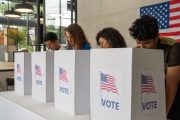Testifying before the National Security Subcommittee of the House Oversight and Government Affairs Committee on March 23, Brandon Judd, the president of the National Border Patrol Council, said that arrests of illegal aliens from Afghanistan and Pakistan has increased markedly since last year. A greater number of illegal aliens from China has kept pace with last year’s figures, as well.
For comparative purposes, Judd provided these figures:
In all of Fiscal Year 2015, the United States Border Patrol arrested 5 persons from Afghanistan, 57 from Pakistan and 1,327 from the People’s Republic of China. Already in the first five months of this fiscal year, the United States Border Patrol has arrested 18 from Afghanistan, 79 from Pakistan and 619 from the People’s Republic of China.
If last year’s arrest rates were extended to this year, the number of arrests of illegal border crossers would have been two from Afghanistan, 24 from Pakistan, and 552 from China. Therefore month-to-month, the rate is up 900 percent from Afghanistan, 237.5 percent from Pakistan, and 112 percent from China.
Judd noted in his testimony:
Those numbers should alarm everyone and we are seeing a similar trend from other key countries like Albania, Bangladesh and Brazil. If the single factor for the litmus test is lower numbers, then compared to fiscal year 2015, one must conclude that we are failing.
Judd began his testimony by noting that the Obama Administration and U.S. Customs and Border Protection (CBP) Commissioner Gil Kerlikowske have repeatedly told the American public that the border is more secure today than it’s ever been. He immediately countered this assertion, saying, “As a Border Patrol Agent, I will tell you the exact opposite.”
Later in his testimony, Judd said, “As someone who has been involved in border protection for over 18 years, I can unequivocally tell you the border is not secure and the situation is getting worse instead of better.”
During his testimony, Judd talked a lot about the amount of power that the drug cartels have along the border, noting:
It is well documented that criminal cartels control the border in the same way inmates control most prison facilities. The cartels are extremely well organized, pathologically violent and have an entire infrastructure on both sides of the border.
Though the violent nature of the drug cartels and their constant transportation of illegal drugs across our border is serious enough, there is another enterprise that they are engaged in that is potentially even more threatening — human smuggling, which Judd says “is big business worth hundreds of millions of dollars each year.”
Judd said that “most aliens are paying close to $10,000 per person. Higher value aliens, such of those from the Middle East or Asia, pay almost double this figure.”
When illegal aliens from the Middle East are considered, the immediate cause of concern is that that area of the world is a hotbed of terrorist activity. As Europeans have seen in recent months with the terrorist attacks in Paris and Brussels, when aliens from the Middle East are allowed free access to nations, the threat of terrorism escalates from being theoretical to becoming a reality.
We wrote much last year about the huge surge of illegal aliens that crossed the southern U.S. border, a surge that included large numbers of unaccompanied minors and incomplete family units. One explanation offered for the increase was that most of these aliens were fleeing areas of Central America where violence perpetrated by the drug cartels have made life unbearable. We see a parallel in Europe, where tens of thousands of refugees have fled to from areas of the Middle East devastated by civil war and the rise of terrorist groups like ISIS. With waves of these refugees entering Europe, however, the threat of ISIS members and other terrorists embedding themselves among them has become a real danger, as Paris and Brussels have shown us.
In his testimony, Judd brought up a connection between the large numbers of unaccompanied alien children and the activities of the drug cartels that may not be apparent to most people. He stated:
These unaccompanied minors and family groups also serve another more lucrative purpose. They are human screens that tie up Border Patrol Agents while the cartels smuggle narcotics and higher value aliens behind them who, if caught, will be deported back to their home country.
Judd provided great detail about the strategy the drug cartels used to accomplish this objective:
Late in the year of 2013 and throughout all of 2014, an unprecedented number of unaccompanied minors entered our country illegally through the Rio Grande Valley Sector of operations. Instead of presenting themselves legally at Ports of Entry and asking for asylum, the unaccompanied minors were forced by the cartels to enter illegally at dangerous points along the border….
The cartels understood that the unaccompanied minors would force the Border Patrol to deploy Agents to these crossing areas in order to take the minors into custody…. The unaccompanied minors could have walked right up to the Port of Entry and asked for asylum. Why did the cartels drive them to the middle of the desert and then have them cross over the Rio Grande, only to surrender to the first Border Patrol Agent they came across? The reason is that it completely tied up our manpower and allowed the cartels to smuggle whatever they wanted across our border.
And this was just one part of the equation, noted Judd. Even more threatening to our ability to secure our border is our government’s “catch and release” policy, by which the same illegal border crossers keep reentering our country through a virtual revolving door on our borders. As the surge became too much to handle, the Border Patrol and the Enforcement and Removal Office began releasing nearly everyone they arrested.
A significant part of Judd’s testimony was his revelation that the arrests of illegal aliens from Afghanistan and Pakistan has increased markedly since last year. The seriousness of these increases is reflected in an article we posted last January reporting that two Pakistani nationals, Muhammad Azeem and Mukhtar Ahmad, who had been linked to terrorism, were apprehended by Border Patrol agents near San Diego last September.
A writer for the Washington Times, which broke the story, theorized that the two Pakistani men most likely took advantage of smuggling networks or other secretive routes commonly used by illegal immigrants to travel from Central America to the U.S. border.
The report quoted from a letter that Representative Duncan Hunter (R-Calif.) wrote to Homeland Security Secretary Jeh Johnson in December demanding to know how many people listed in the FBI’s terrorist screening database have been apprehended at the border. Duncan wrote:
The southern land border remains vulnerable to intrusion and exists as a point of extreme vulnerability.
Evidently there are criminal organizations and individuals with the networks and know-how to facilitate illegal entry into the United States without regard for one’s intentions or status on a terrorist watch list. The detention of the two Pakistani nationals underscores the fact that any serious effort to secure our homeland must include effective border security and immigration enforcement.
This incident involving the two Pakistani men with links to terrorism in their home country is but one of many cases indicative of the porous nature of our southern border and the ease with which illegal aliens — including terrorists — can enter our country.
The treat of terrorism has made our world a much more dangerous place than it was in years past. While national sovereignty and economic concerns have always made securing our borders important, terrorism has made safeguarding our borders absolutely essential. It is no longer a matter of preventing agricultural workers from Mexico from crossing our border illegally to pick grapes in California. No one died as a result of their actions.
But the recent terrorist attacks in Europe, killing 130 people in Paris last November and 34 people in Brussels this month, highlight how high a price a nation that fails to secure its borders will pay. And the problem goes beyond securing the borders, because the EU’s overly loose migration and refugees policies were undoubtedly a contributing factor to the terrorist attacks.
We have seen our share of terrorism in the United States as well, as the attacks of 9/11 have shown us. If we are to be secure, we must not only secure our borders, but conduct thorough security checks on all whom we allow to cross them. We must know who the aliens we allow to enter our country are — and where they are. Since a reliable intelligence apparatus is necessary to accomplish this, it might be time to reestablish the old House Un-American Activities Committee, which was abolished in 1975.
Photo of fence along U.S.-Mexico border: AP Images
Related articles:
Pakistanis With Terrorrism Ties Caught After Crossing U.S.-Mexican Border
Border Patrol: Obama Has “No Intention” of Deporting Illegals
Arizona Sheriff: Obama Administration Has “Handcuffed” Border Patrol
Border Patrol Agents Ordered to Stand Down in Enforcing Immigration Laws
Germany Does Not Know Where 130,000 Asylum Seekers Are
German Intelligence Says ISIS Fighters Are Among Refugees
DHS Inspector General’s Report Notes “Security Issues” Along S.W. Border
Border Patrol Union Leader Sees Surge in Unaccompanied Children Coming
Border Patrol Agent: Obama Admin. Releasing Murderers Into U.S.
Former Border Patrol Agents: Illegal Immigration Crisis “Contrived”
Obama Opens Borders, Releases Illegal Immigrants Into U.S.
Border Patrol Union Leader Says Administration Offers “De Facto Amnesty”





